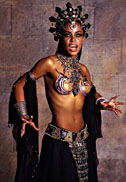
Movie Guru Rating:

Comment
on this review
| |

Queen of the Damned doesn't add much to the Anne Rice canon.
by Jesse Fox Mayshark
For starters, let's just stipulate that Queen of the Damned isn't a very good movie. I could spend the next 900 words explaining why: the incoherence of the overlapping plotlines, the strange absence of a main character, the tired music-video "goth" look of the whole thing, the doom-rock soundtrack by boring old Jonathan Davis (of the turgid band Korn). But it would be belaboring the point.
Suffice it to say that there's too much going on for too little discernible reason. And suffice it also to say that, as not-good movies go, Queen of the Damned has its pleasant diversions. It feels kind of like an entire season of a Fox TV series, all the back stories and complex character relationships, boiled down and crammed into a two-hour special. Forget the three-act structure—this is more like nine or 12 acts, conflict following resolution following conflict. As such, it's rarely dull. It just doesn't make much sense.
But there are two or three things about the film worth further discussion. The first is its source material. Like Interview With the Vampire, Neil Jordan's considerably more elegant 1994 film, Queen of the Damned is based on the overripe prose of Anne Rice's "Vampire Chronicles." Opting for efficiency over fidelity, it actually combines parts of the series' second and third books (The Vampire Lestat and Queen of the Damned respectively), dropping and adding characters and events as needed. Judging from the film's official website, this has resulted in predictable howls of protest from the Anne Rice faithful. The website includes surprisingly candid and entertaining commentary from Queen's producer, Jorge Saralegui, who more or less begs for forgiveness on several points. (When he gets around to politely protesting that "[j]udging a person's talent based on one work is a little harsh," you can't help warming to the guy. Many producers have foisted far worse movies upon us without so much as a beg-your-pardon.)
Rice has been building her audience for a quarter-century now, and they're at least as fanatic and finicky a bunch as any Harry Potter readers. You could even make a case for Rice's socio-cultural significance. The Vampire Chronicles' conquest of the bestseller lists preceded and fueled the rise of the entire goth subculture as it currently exists, influencing fashion, music and films long before any of her books actually made it to the screen. She shook the casket dust off Bram Stoker's cape and infused the 19th century romantic vampire mythos with 20th century existential angst, in the process replacing its Victorian moral system (in which virgins are forever being rescued by men with pointed sticks) with red-blooded eroticism. Her vampires are seductive and sensual, and they are not always made to suffer for it.
But one thing Queen of the Damned makes clear is that Rice's original vision has long since passed into cliché. We've had dozens of vampire heroes and anti-heroes in the past few decades, from The Lost Boys to Near Dark to Shadow of the Vampire. We've had vampire slayers (Buffy and Blade), vampire bohemians (Lili Taylor in The Addiction, Elina Lowensohn in Nadja), vampire yuppies (Nicolas Cage in Vampire's Kiss), even vampire children (Kirsten Dunst in Interview With the Vampire). We're pretty well vampired out. And it's not just the vampires—everything about Rice's world, from its black velvet decadence to its mordant amorality (as one line in Queen of the Damned puts it, "In the end, we are all alone in this cold, dark eternity"), feels as overdone as Trent Reznor's eyeliner.
At least one thing about Queen of the Damned does feel fresh—the presence of young R&B singer Aaliyah in the title role. Aaliyah died in a plane crash late last summer, so it would be easy to over-praise her performance here by way of posthumous deference. Really, it's hard to tell whether she ever would have been much of an actress. She has few lines of dialogue to work with, and even fewer good ones, and she has to speak them with a mouth full of fake teeth and a funny Egyptian accent. That she pulls it off at all is accomplishment enough. She seems to be having fun as the murderous, sexy vampire queen; in a scene where she surveys a beach strewn with corpses, she musters an eye-glinting glee that is supremely creepy. It was a gutsy role for her to take (compare it to Britney Spears' wholesome turn in Crossroads), and it does make you wish you could see more. Also, given the dark murmuring undertow of her best music (especially the songs she recorded with pioneering producer Timbaland), it's incomprehensible to me that the filmmakers missed the chance to use her on the soundtrack.
Finally, a few thoughts on the special effects, such as they are. Queen of the Damned is a mid-budget movie, so it's a good chance to assess the state of mainstream visual razzmatazz. What I think is this: digitally-enhanced crowd scenes still look fake and blurry; I liked The Matrix as much as everybody else, but I don't understand why every scene of hand-to-hand combat in every movie now must incorporate slo-mo upside-down kicks and speed-up/slow-down camera tricks; and flying-over-the-city technology hasn't really improved much since Christopher Reeve and Margot Kidder did it in Superman. We believe a man can fly, already. Show us something we don't know.

February 21, 2001 * Vol. 12, No. 8
© 2000 Metro Pulse
|